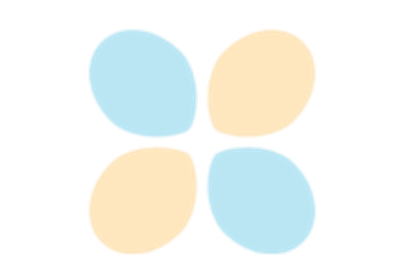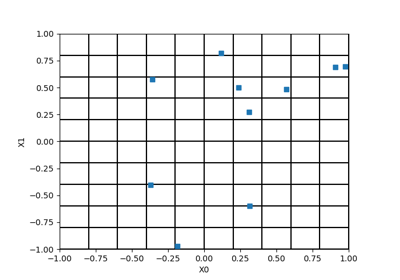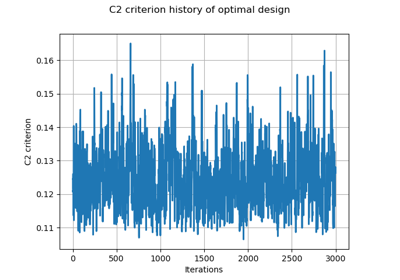SpaceFillingC2¶
- class SpaceFillingC2(*args)¶
Space filling C2 (centered L2-discrepancy) computation.
Methods
evaluate(sample)Compute the C2 criterion for a specific design.
Accessor to the object's name.
getName()Accessor to the object's name.
hasName()Test if the object is named.
Minimization flag accessor.
perturbLHS(oldDesign, oldCriterion, row1, ...)Elementary perturbation.
setName(name)Accessor to the object's name.
Notes
Compute the centered L2 discrepancy:
- __init__(*args)¶
- evaluate(sample)¶
Compute the C2 criterion for a specific design.
- Parameters:
- design
Sampleor 2d array like The design
- design
- Returns:
- critfloat
The C2 criterion
Examples
>>> import openturns as ot >>> # Build an LHS using openturns class >>> lhs = ot.LHSExperiment(ot.Uniform(), 100) >>> design = lhs.generate() >>> # Compute the C2 criterion >>> crit = ot.SpaceFillingC2().evaluate(design)
- getClassName()¶
Accessor to the object’s name.
- Returns:
- class_namestr
The object class name (object.__class__.__name__).
- getName()¶
Accessor to the object’s name.
- Returns:
- namestr
The name of the object.
- hasName()¶
Test if the object is named.
- Returns:
- hasNamebool
True if the name is not empty.
- isMinimizationProblem()¶
Minimization flag accessor.
- Returns:
- isMinimizationbool
Whether the problem is a minimization.
- perturbLHS(oldDesign, oldCriterion, row1, row2, column)¶
Elementary perturbation.
- Parameters:
- design
Sample The design to perturb (in-place)
- oldCriterionfloat
The previous value of the criterion
- row1int
First row index
- row2int
Second row index
- design
- Returns:
- criterionfloat
The value of the criterion
- setName(name)¶
Accessor to the object’s name.
- Parameters:
- namestr
The name of the object.
 OpenTURNS
OpenTURNS


